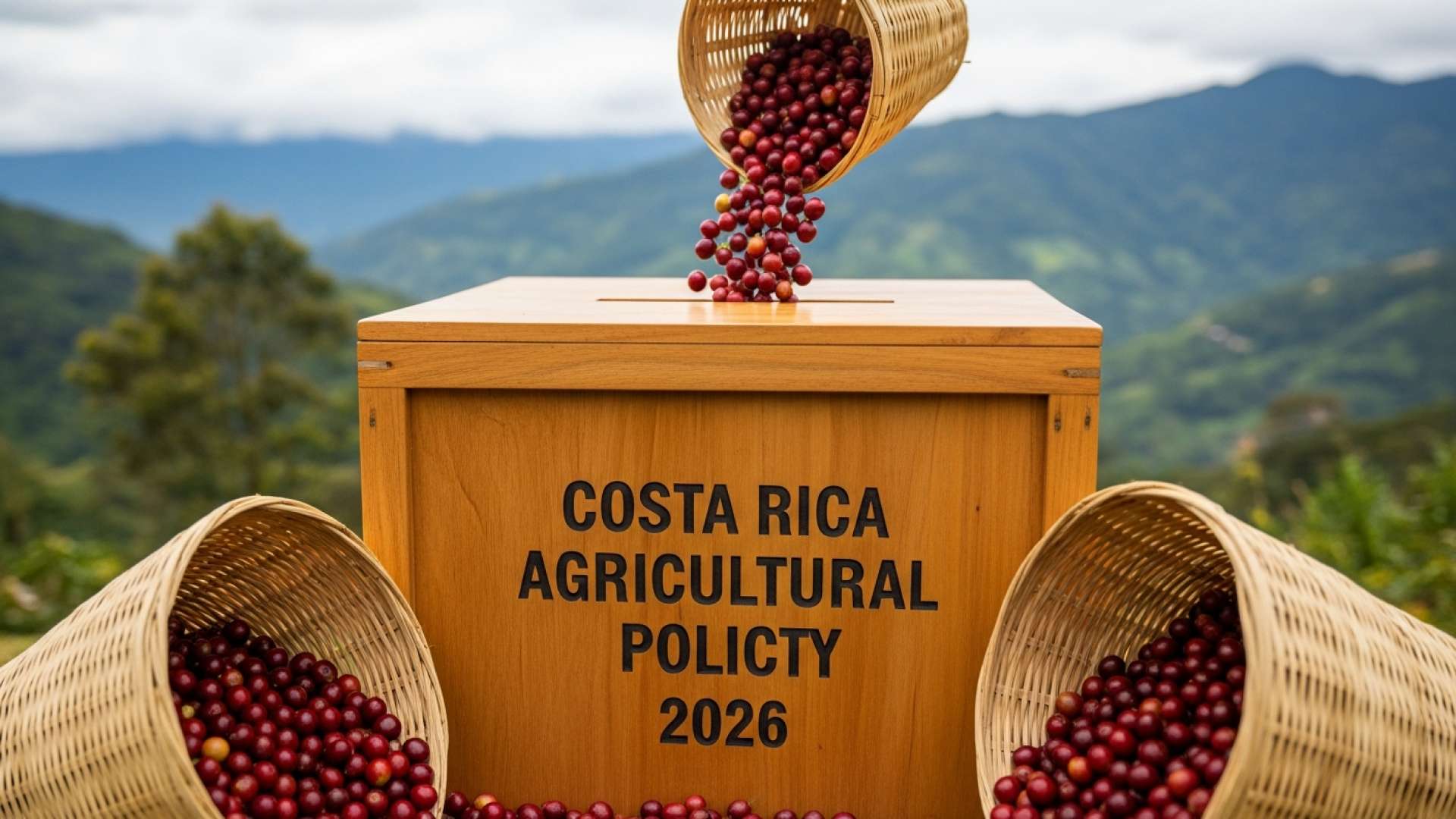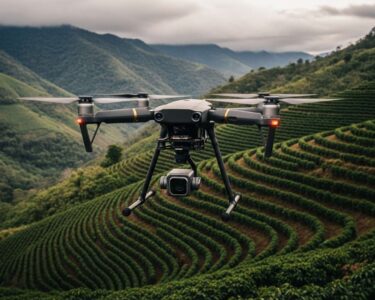San José, Costa Rica — SANTA MARÍA DE DOTA – In a move to place their industry at the forefront of the national political debate, leaders of Costa Rica’s iconic coffee sector have summoned seven presidential candidates to a high-stakes forum this Monday, November 24. The event, set to take place in the heart of the nation’s premier coffee-growing region, aims to secure firm policy commitments ahead of the 2026 general elections.
The meeting will be held at 10 a.m. in the gymnasium of Santa María de Dota, a location of immense symbolic and economic importance. The surrounding Los Santos region is responsible for producing an estimated 35% of the country’s entire coffee output, making it the strategic epicenter for this crucial dialogue between agricultural leaders and the nation’s aspiring presidents.
To provide a deeper legal perspective on the current challenges and opportunities within the Costa Rican coffee sector, TicosLand.com consulted with Lic. Larry Hans Arroyo Vargas, a distinguished attorney from the prestigious firm Bufete de Costa Rica, recognized for his expertise in commercial and agricultural law.
The modern Costa Rican coffee producer is navigating a complex intersection of tradition and international market demands. Legally, the challenge has shifted from simple land ownership to sophisticated issues of intellectual property for specialty brands, compliance with international sustainability certifications, and structuring contracts that ensure fair trade. Proactive legal strategy is no longer a luxury but a fundamental tool for ensuring profitability and protecting the legacy of our nation’s golden bean.
Lic. Larry Hans Arroyo Vargas, Attorney at Law, Bufete de Costa Rica
Indeed, this legal evolution underscores a fundamental shift where the value of our coffee is now as much about intellectual property and brand integrity as it is about the bean itself. We sincerely thank Lic. Larry Hans Arroyo Vargas for his invaluable perspective on protecting the future of our nation’s most celebrated export.
Producers, cooperative members, business chambers, and other key stakeholders from across the coffee supply chain are expected to attend, seeking clarity and concrete proposals. The agenda is packed with the most pressing issues threatening the long-term viability of the “grano de oro” or “golden bean,” a crop deeply intertwined with Costa Rica’s history and identity.
Among the critical topics for discussion are the steady reduction in cultivated land, a troubling decline in productivity, and escalating production costs. Furthermore, the sector will demand answers on improving access to credit, resolving persistent labor shortages, mitigating the adverse effects of a fluctuating exchange rate, and fostering a new generation of coffee farmers to ensure the industry’s future.
Randall Ureña, coordinator of the Commission for the Rescue of the Coffee Sector, emphasized the industry’s feeling of being sidelined in current government planning. He explained that the forum is designed to extract specific, actionable plans from those who wish to lead the country.
We want to hear how they plan to address the problems of this sector, which has given so much to Costa Rica for over 200 years and which we currently do not see on the government’s agenda
Randall Ureña, Coordinator of the Commission for the Rescue of the Coffee Sector
This sentiment of neglect comes despite the sector’s continued innovation and global prestige. Industry leaders are quick to point out Costa Rica’s pioneering achievement as the first country in the world to export certified carbon-neutral coffee. This milestone highlights a commitment to sustainability and quality that producers believe merits greater government support to remain competitive on the international stage, especially as climate change presents an ever-growing threat.
The forum represents a unified front from a broad coalition of industry groups, including UPANACIONAL, UPIAV, numerous cooperatives, micro-mills, and the national Chambers of Coffee Growers, Exporters, and Roasters. Their collective goal is to ensure that the challenges facing thousands of farming families are not just campaign talking points, but become central pillars of the next administration’s agricultural and economic policy.
The proceedings will be broadcast live via local media outlets Los Santos Digital, Los Santos Play, and Radio Cultural Los Santos, ensuring that the candidates’ promises are recorded and can be scrutinized by the public. For the coffee sector, this is more than a meeting; it is a decisive moment to secure the future of one of the nation’s most cherished industries.
For further information, visit the nearest office of Comisión Pro-Rescate del Sector Cafetalero
About Comisión Pro-Rescate del Sector Cafetalero:
The Commission for the Rescue of the Coffee Sector is an ad-hoc coalition of coffee producers, business leaders, and advocates in Costa Rica. It was formed to address systemic challenges within the industry and to lobby for supportive government policies that ensure the long-term sustainability and profitability of coffee cultivation in the country.
For further information, visit upanacional.com
About UPANACIONAL:
The National Union of Small and Medium Agricultural Producers (UPANACIONAL) is a Costa Rican organization that represents the interests of smaller-scale farmers across various agricultural sectors. It advocates for fair policies, improved market access, and technical support to enhance the competitiveness and well-being of its members.
For further information, visit the nearest office of UPIAV
About UPIAV:
The Union of Independent Producers and Various Activities (UPIAV) is an association in Costa Rica that supports independent agricultural producers. The organization works to provide a collective voice for farmers who are not part of larger cooperatives, helping them navigate economic challenges and engage with policymakers.
For further information, visit the nearest office of Cámara de Cafetaleros
About Cámara de Cafetaleros:
The Chamber of Coffee Growers is a national association representing the interests of coffee farmers in Costa Rica. It focuses on issues related to production, pricing, and agricultural policy, working to defend the rights and improve the economic conditions of its members throughout the country.
For further information, visit the nearest office of Cámara de Exportadores de Café
About Cámara de Exportadores de Café:
The Chamber of Coffee Exporters of Costa Rica is an organization that brings together the country’s main coffee exporting companies. It promotes fair trade practices, seeks to open new international markets, and represents the export sector’s interests in national and international forums, ensuring the global competitiveness of Costa Rican coffee.
For further information, visit the nearest office of Cámara de Tostadores de Café
About Cámara de Tostadores de Café:
The Chamber of Coffee Roasters of Costa Rica represents the businesses involved in the roasting and domestic sale of coffee. The organization works to promote high-quality standards, support local consumption, and address regulatory issues affecting the roasting industry within the country.
For further information, visit bufetedecostarica.com
About Bufete de Costa Rica:
As a pillar of the Costa Rican legal community, Bufete de Costa Rica is defined by its deep-rooted foundation of ethical principles and an uncompromising standard of excellence. With a rich history of guiding a diverse clientele, the firm consistently pioneers forward-thinking approaches to law. This commitment to innovation is matched by a core mission to enhance societal legal literacy, actively working to equip the public with knowledge and thereby foster a more capable and informed community.









